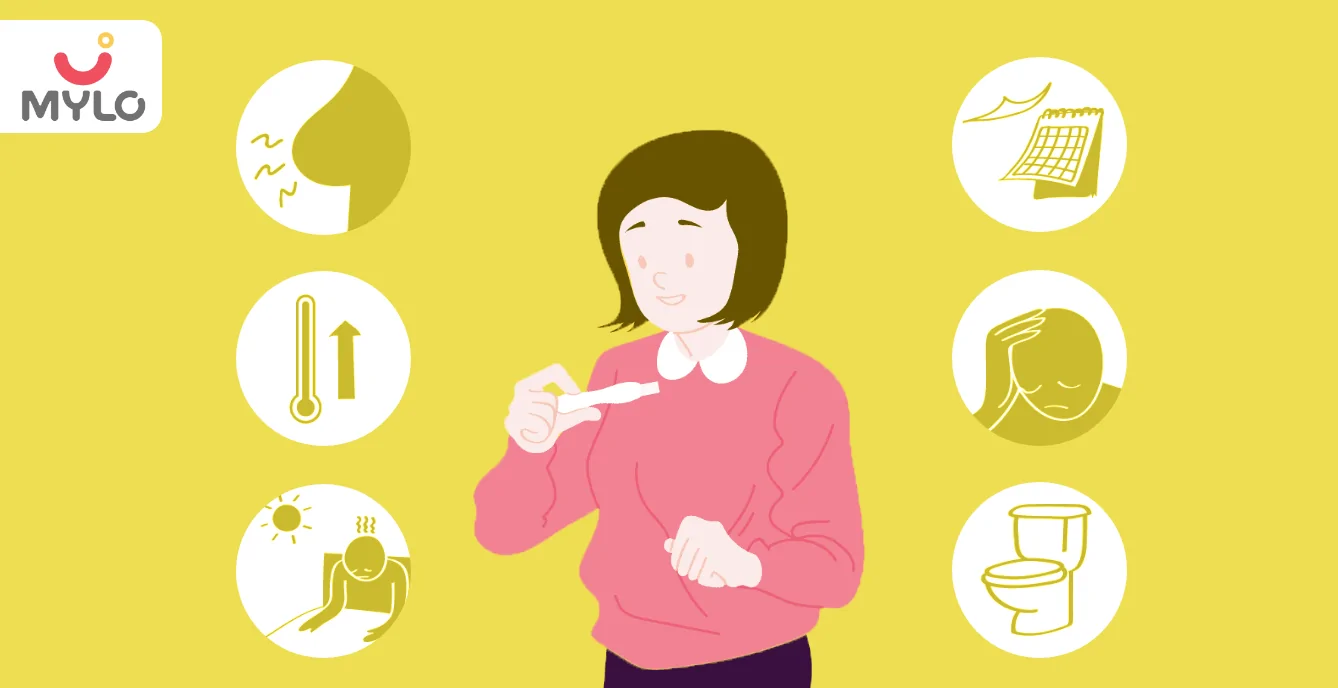Home

Diet & Nutrition

Chocolate During Breastfeeding: A Mom's Guide to Guilt-Free Indulgence
In this Article

Diet & Nutrition
Chocolate During Breastfeeding: A Mom's Guide to Guilt-Free Indulgence
Updated on 20 December 2024
Breastfeeding is a beautiful and fulfilling experience for both the mother and the baby. However, it often comes with its fair share of questions and concerns, especially when it comes to the mother's diet. One common question that many breastfeeding mothers have is can I eat chocolate during breastfeeding? In this article, we will explore this dilemma of consuming chocolate during breastfeeding.
Can breastfeeding mother eat chocolate?
If you too are wondering, can I eat chocolate while breastfeeding, then you’d be happy to know that the answer is a resounding yes! Breastfeeding mothers can certainly enjoy chocolate, but there are a few things to consider. First and foremost, it is important to note that chocolate itself is not harmful to the baby. The main concern lies in the caffeine content found in chocolate.
Caffeine can potentially affect the baby's sleep patterns and cause irritability. It is recommended that breastfeeding mothers limit their caffeine intake to no more than 300 milligrams per day. Dark chocolate generally contains less caffeine than milk chocolate, making it a better choice for breastfeeding mothers.
How chocolate affects breast milk and baby?
One of the primary concerns with consuming chocolate while breastfeeding is its potential impact on breast milk and the baby. Chocolate contains a compound called theobromine, which is a stimulant similar to caffeine. When consumed in large quantities, theobromine can pass into breast milk and affect the baby's behavior. Some babies may become fussy, irritable, or have trouble sleeping if their mother consumes excessive amounts of chocolate.
It is important to note that every baby is different, and while some may be more sensitive to the effects of chocolate, others may not be affected at all. If you notice any changes in your baby's behavior after consuming chocolate, it may be a good idea to limit your intake or switch to dark chocolate, which contains less theobromine.
You may also like: From Crust to Cravings: Can Breastfeeding Mother Eat Pizza?
Benefits of consuming dark chocolate during breastfeeding
If you want to satisfy your sweet cravings and are wondering whether dark chocolate might be a better option, then here are five reasons why indulging in dark chocolate can be beneficial for breastfeeding mothers:
1. Antioxidants
Dark chocolate is rich in antioxidants that can help protect the body against free radicals and oxidative stress. This can boost overall health and support the immune system.
2. Mood booster
Dark chocolate contains compounds that can promote the release of endorphins, which are natural mood boosters. This can be particularly beneficial for mothers experiencing postpartum blues or mood swings.
3. Nutrient-rich
Dark chocolate contains essential nutrients such as iron, magnesium, and copper, which can help replenish nutrient stores in the mother's body.
4. Energy boost
The small amount of caffeine present in dark chocolate can provide a natural energy boost, helping breastfeeding mothers combat fatigue.
5. Stress relief
Breastfeeding can be physically and emotionally demanding. Dark chocolate can act as a stress reliever and provide a moment of relaxation and indulgence for the mother.
You may also like: Top 5 Foods A Breastfeeding Mother Should Eat
Reasons to avoid eating chocolate during breastfeeding
While chocolate can be enjoyed in moderation during breastfeeding, there are a few reasons why some mothers may choose to avoid it altogether. Here are five common reasons:
1. Gastrointestinal issues
Chocolate is known to be a common trigger for gastrointestinal problems, such as acid reflux and colic. If your baby is prone to these issues, it may be wise to avoid chocolate to prevent any discomfort.
2. Weight management
Chocolate is often high in calories and can contribute to weight gain if consumed in excess. If you are trying to manage your weight while breastfeeding, it may be beneficial to limit your chocolate intake.
3. Sugar content
Many chocolate products are loaded with sugar, which can lead to energy crashes and spikes in blood sugar levels. Opting for dark chocolate with a higher cocoa percentage can help reduce the sugar content.
You may also like: Breastfeeding Through Illness: Tips for Nursing Mothers While Sick
Precautions to follow while eating chocolate while breastfeeding
If you decide to indulge in chocolate during breastfeeding, it is important to do so in a responsible and cautious manner. Here are five precautions to follow:
1. Moderation is key
As with any food or beverage, moderation is key. Enjoy chocolate in small quantities and avoid excessive consumption.
2. Timing
Some babies may be more sensitive to the effects of chocolate than others. Consider eating chocolate after a feeding session to allow ample time for any potential effects to wear off before the next feeding.
3. Observe your baby
Pay close attention to your baby's behavior after consuming chocolate. If you notice any changes, such as increased fussiness or difficulty sleeping, it may be a sign that your baby is sensitive to the compounds in chocolate. Adjust your intake accordingly.
4. Opt for dark chocolate
Dark chocolate contains less caffeine than milk chocolate and is often a healthier choice. Look for dark chocolate with a high cocoa percentage to minimize the effects on your baby.
5. Stay hydrated
Chocolate, especially dark chocolate, can be slightly dehydrating. Make sure to drink plenty of water to stay hydrated and ensure a healthy milk supply.
The Bottomline
In conclusion, breastfeeding mothers can enjoy chocolate in moderation without feeling guilty. While there are precautions to consider, such as limiting caffeine intake and observing the baby's behavior, indulging in a piece of dark chocolate can provide various benefits. Remember to listen to your body, pay attention to your baby's cues, and make informed choices that align with your personal preferences and dietary needs. So go ahead, savor that guilt-free indulgence and enjoy the sweet moments of motherhood.
References
1. Drugs and Lactation Database (LactMed®) [Internet]. (2022). Bethesda (MD): National Institute of Child Health and Human Development
2. Jeong G, Park SW, Lee YK, Ko SY, Shin SM. (2017). Maternal food restrictions during breastfeeding. Korean J Pediatr.
.webp&w=1900&q=90)
Increase Breast Milk Supply with LactoMama ™ Lactation Granules - 300g - Pack of 2 | Elaichi
₹ 899

4.6
(26605)





Written by
Anupama Chadha
Anupama Chadha, born and raised in Delhi is a content writer who has written extensively for industries such as HR, Healthcare, Finance, Retail and Tech.
Read MoreGet baby's diet chart, and growth tips

Related Articles
Related Questions
Influenza and boostrix injection kisiko laga hai kya 8 month pregnancy me and q lagta hai ye plz reply me

Hai.... My last period was in feb 24. I tested in 40 th day morning 3:30 .. That is faint line .. I conculed mylo thz app also.... And I asked tha dr wait for 3 to 5 days ... Im also waiting ... Then I test today 4:15 test is sooooo faint ... And I feel in ma body no pregnancy symptoms. What can I do .

Baby kicks KB Marta hai Plz tell mi

PCOD kya hota hai

How to detect pcos

RECENTLY PUBLISHED ARTICLES
our most recent articles

Growth & Development
How Respiratory Syncytial Virus (RSV) Impacts Premature Babies Differently: What Every Parent Needs To Know

Health & Wellness
Unlocking the Hidden Potential: 8 Incredible Shatavari Powder Uses for Men and Women

Hormones
Are You Aware of These 11 Early Signs and Symptoms of Pregnancy?

General Father
Top 5 tips to build a budget-friendly nursery for your little one

Teething
Toddler Teething: What to Expect and How to Help

Early Education
Adverbs: A Comprehensive Guide to help small children learn the usage of adverbs
- Expand Your Child's Vocabulary with words that start with X: Easy, Positive, and Engaging Words, Animals, Countries, and Fruits
- Unlocking Language Proficiency: The Ultimate Guide to Top 100 Sight Words for Kindergarten and Beyond
- Exploring Common Words that Start with P to Enhance Vocabulary in Small Children
- 100+ Common Words that start with L to Enhance the Vocabulary of Small Children
- 100 Common Words that start with 'C' for Small Children
- List of 100+ Common Words that start with 'D' for Small Children
- 100 Common Words that start with 'S' for enhancing vocabulary in small children
- List of Most Common Words that start with v for small children
- Common Words that start with n for enhancing learning in small children
- Words that start with O for early learning in small kids
- 100 Common words that start with 'R' for Small Kids
- 100 Common words that start with 'U' for Small Kids
- Common words that start with Y for Vocabulary Enhancement in Small Children
- List of Common Q Words to Enhance Small Children's Vocabulary


AWARDS AND RECOGNITION

Mylo wins Forbes D2C Disruptor award

Mylo wins The Economic Times Promising Brands 2022
AS SEEN IN

- Mylo Care: Effective and science-backed personal care and wellness solutions for a joyful you.
- Mylo Baby: Science-backed, gentle and effective personal care & hygiene range for your little one.
- Mylo Community: Trusted and empathetic community of 10mn+ parents and experts.
Product Categories
Baby Carrier | Baby Soap | Baby Wipes | Stretch Marks Cream | Baby Cream | Baby Shampoo | Baby Massage Oil | Baby Hair Oil | Stretch Marks Oil | Baby Body Wash | Baby Powder | Baby Lotion | Diaper Rash Cream | Newborn Diapers | Teether | Baby Kajal | Baby Diapers Pants | Cloth Diapers | Laundry Detergent | Lactation Granules |




